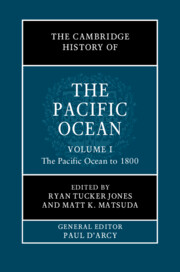Book contents
- The Cambridge History of the Pacific Ocean
- The Cambridge History of the Pacific Ocean
- The Cambridge History of the Pacific Ocean
- Copyright page
- Contents
- Figures
- Tables
- Contributors to Volume I
- Frontispiece
- General Editor’s Introduction
- Preface to Volume I
- Part I Rethinking the Pacific
- Part II Humans and the Natural World in the Pacific Ocean
- Part III Deep Time: Sources for the Ancient History of the Pacific
- Part IV The Initial Colonization of the Pacific
- Part V The Evolution of Pacific Communities
- 22 Towards a Unified Theory for Pacific Colonization, Exchange, and Social Complexity
- 23 The Evolution of China’s Political Economy of the Sea, 960 ce–1900 ce
- 24 China and the Sea in Literature and (Mis)Perception, 1644–1839
- 25 Pacific History Viewed from Eastern Indonesia: The Eastern Archipelago of Southeast Asia and the Sea in the Early Modern Period 1400–1830s
- 26 The Maritime Cultures of the Northwest Pacific Seaboard of the Americas
- 27 Mesoamerican–South American Pre-Columbian Pacific Contacts: Evidence, Objects, and Traditions, 1500 bce–1532 ce
- Part VI Europe’s Maritime Expansion into the Pacific
- References to Volume I
- Index
22 - Towards a Unified Theory for Pacific Colonization, Exchange, and Social Complexity
from Part V - The Evolution of Pacific Communities
Published online by Cambridge University Press: 11 November 2022
- The Cambridge History of the Pacific Ocean
- The Cambridge History of the Pacific Ocean
- The Cambridge History of the Pacific Ocean
- Copyright page
- Contents
- Figures
- Tables
- Contributors to Volume I
- Frontispiece
- General Editor’s Introduction
- Preface to Volume I
- Part I Rethinking the Pacific
- Part II Humans and the Natural World in the Pacific Ocean
- Part III Deep Time: Sources for the Ancient History of the Pacific
- Part IV The Initial Colonization of the Pacific
- Part V The Evolution of Pacific Communities
- 22 Towards a Unified Theory for Pacific Colonization, Exchange, and Social Complexity
- 23 The Evolution of China’s Political Economy of the Sea, 960 ce–1900 ce
- 24 China and the Sea in Literature and (Mis)Perception, 1644–1839
- 25 Pacific History Viewed from Eastern Indonesia: The Eastern Archipelago of Southeast Asia and the Sea in the Early Modern Period 1400–1830s
- 26 The Maritime Cultures of the Northwest Pacific Seaboard of the Americas
- 27 Mesoamerican–South American Pre-Columbian Pacific Contacts: Evidence, Objects, and Traditions, 1500 bce–1532 ce
- Part VI Europe’s Maritime Expansion into the Pacific
- References to Volume I
- Index
Summary
A materialist political economy strain within theorizing social complexity in the Pacific has been evident at least since Marshall Sahlins’s 1958 Social Stratification in Polynesia. It developed further through contributions from anthropologists Irving Goldman and Jonathan Friedman, before being taken up by archaeologists in the early 1980s. Feeling that progress had stalled somewhat in the further development of such an approach as we entered the second decade of this century, Tim Earle and myself sought in 2015 to bring the political economy approach in Pacific archaeology into dialogue with developments in archaeological theory over the previous decade or so. The engagement with related theoretical approaches continued in a wider collaboration of 2019 with Martin Furholt, Colin Grier, and Tim Earle again. The chapter discusses this history of Pacific political economy approaches as the necessary background in posing the question of whether a unified theory of colonization, exchange, and social complexity can be constructed. It canvasses a mixture of factors that drove seaborne migration across what is now a largely Austronesian-speaking third of the world’s surface, the Pacific Ocean. Longstanding cultural and social patterns determined temporary alliances between elite factions and commoners that allowed fission of communities to take place. Developments in sea transport technologies capable of long-distance transportation for founding populations gave added impetus for maritime colonizing expeditions that ended up reaching almost every Pacific island capable of sustaining human life. Common themes of the interplay of island size, resources, and connectivity or isolation helped determine the outcome of settlement in terms of the possibilities and limits available for particular sociopolitical forms to evolve and sustain themselves.
- Type
- Chapter
- Information
- The Cambridge History of the Pacific Ocean , pp. 499 - 520Publisher: Cambridge University PressPrint publication year: 2023



